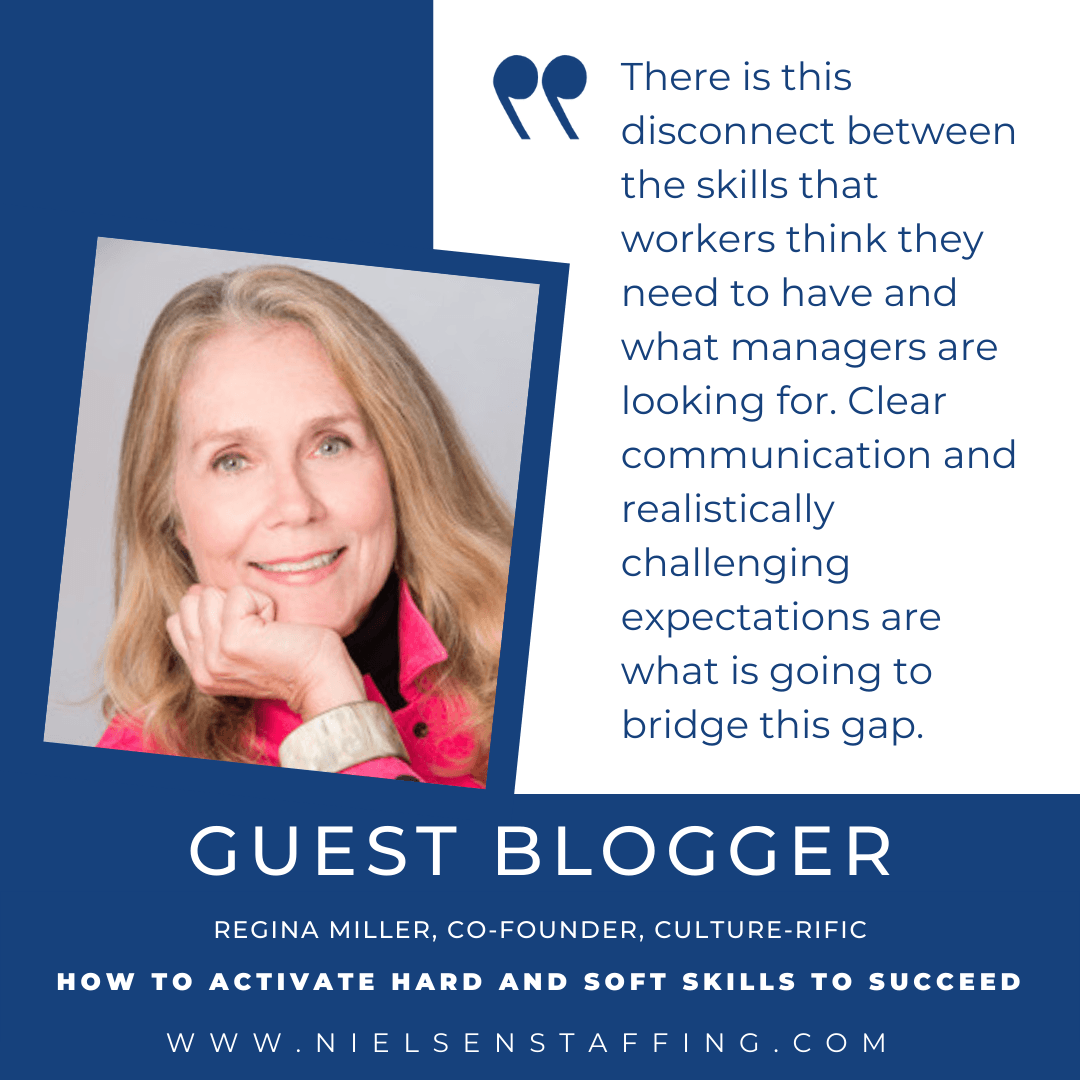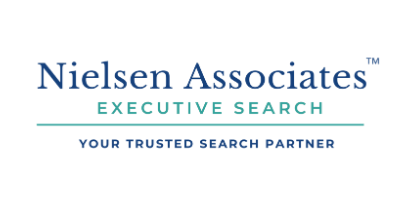How to Activate Hard and Soft Skills to Succeed
We’re excited to begin 2022 with guest blogger, Regina Miller. Regina is the Co-Founder of Culture-rific, a boutique leadership and culture consulting company that works with people and organizations to implement lasting change. They offer professional development and coaching programs focused on leadership, resiliency and well-being.
Regina is a senior executive coach, facilitator, and business consultant with more than twenty-five years of proven success and experience in Organization and Leadership Development.
She’s held senior and executive roles in large enterprises and startups; and she has worked for and consulted to large enterprises in a wide variety of industries and sectors including MetLife, Nokia, Banana Republic, Rackspace, Coach, Thomson Reuters, and Fujitsu, to name a few.
With so much knowledge and experience, we wanted to get her perspective and share it with you.
Specifically, we wanted to have an honest conversation about leadership - what the struggles are in hybrid and remote workplaces - and why skilled leadership is more critical now. Here’s what Regina shared on leading during uncertainty and unprecedented change.

When You Feel Like the Sky is Falling, Look Up, Across, and Inward
A Conversation with Leadership Expert,
Regina Miller
What are managers struggling with at the current moment?
RM: What I see mostly right now with my clients is a state of overwhelm. I’m talking about skilled, savvy, competent, highly-regarded managers at all levels who are struggling to deal with the sheer magnitude of work, objectives, change, increasing expectations, and deliverables. I see managers who are not being given the resources – people, budgets, technology -- to be successful. I see managers who are expected to jump back in as technical experts to not miss deliverables. I see managers who are fearful to say “NO” because if they do, their career reputations will be tarnished, and their competence questioned. I see managers who are burned out and looking for new opportunities. Surely, rock, hard place for managers today.
What’s causing the struggle— what has changed, increased, since when? What’s going on out there?
RM: Even though the pandemic is still here, we are operating in a post-pandemic workplace. The workplace is hybrid; and there are unrelenting world pressures and demands. The outside has a tremendous impact on the inside. With supply chain issues and the great resignation, supply and demand of raw materials and talent is at risk. Nearly 12% of workers have quit since April 2020; and 95% of workers are currently considering changing jobs. The biggest group is mid-level employees, ages 30 to 45. (Britt Andreatta, The Great Resignation is Quickly Becoming The Great Revolt: 5 Actions Leaders Should Take Now.)
Meaningful missions, with leadership and people who care, bring greater workplace resilience and satisfaction. Although, when people are pushed to their absolute limits, missions become less meaningful, and people start to care less, they burn-out, they leave. Every organization feels the same pain, but it manifests differently. Organizations must assess the impact of these new dilemmas and address emerging needs pro-actively by asking people to speak up, get involved in reworking business processes, and improving interdepartmental collaboration.
The pressures, stress, and lack of empathy and recognition in the workplace have led to workers burning out. Many of the executives I coach recognize this, and ASK their teams how they are feeling, and remind them to take their leave. And even more importantly, they strategically demonstrate balancing their own work/life harmony goals. At the same time, I coach many others who are afraid to ask how their people feel as they do not feel equipped to handle the range of feedback and emotional reactions, especially when they do not have the support of upper leadership. And yet, according to resilience expert Dr. Deborah Gilboa, “Everybody keeps saying that empathy is really going to strengthen employees. However, you can't have empathy for someone if you never give them the opportunity to express their feelings.”
So, managers have to ask, and have to make it safe for people to speak up; and they have to be brave enough to do something about what they hear. The pandemic created an interruption in how we live, work and exist in the world. It’s now everyone's responsibility to interrupt business as usual and seek opportunities for honest, authentic conversation.
“When people are pushed to their absolute limits, missions become less meaningful, and people start to care less, they burn-out, they leave.”

Can you share any real and practical strategies that have been effective?
RM: In one of my client organizations, there are two initiatives that seek to build resilience and create opportunities for honest and authentic conversations.
1) Resilience Missions
As part of an ongoing Leadership Development initiative, senior leaders take on three 90-day individual resilience missions and work with an executive coach to build skills in this area. This program is proving effective because the leaders realize that if they do not practice resilience strategies and approaches, they cannot be an effective leader of others.
2) Mastermind Sessions
As part of an ongoing Supervisory Development initiative, new and experienced supervisors in the same organization come together using a mastermind model to address their issues and concerns. They openly share advice, experiences, ideas, approaches and best practices to deal with tough problems and challenges that they’re facing or might encounter. They learn from each other, support each other’s development, and build in accountability goals. This program is proving effective because it subtly and overtly creates a level of empathy and trust among supervisors who lead different functions in the same organization.
What are the skills today’s managers need to be successful in these messy times?
RM:
Manage 360:
Hone the ability to influence and manage up, sideways and direct reports. And here’s why: problem solving and critical thinking around where there are gaps in the process-- and getting them fixed-- are what workplaces need right now.
Step back to identify rationally what the key problem areas are. For example, if there is an inability to fill vacancies on your team quickly, report the issues as a leadership alert using data and analysis. Discuss implications on customers, morale, overtime, etc. Develop relationships with internal service providers to understand clarity of roles, expectations, and timelines for hiring. In short, take ownership. Then step back, and reset yourself so that you can address the issues organizationally, with influence and assertiveness.
Resilience:
At the same time, get a grip on your own level of overwhelm. What are you doing to support physical, spiritual, psychological and community well-being? What are you doing to manage your own level of resilience at work? Without this step, you may be facing an uphill drive with no gas in your tank. Breathing, meditating, exercising, sleeping, and eating correctly are all answers to the resilience puzzle.
The Ability to Say No:
You can’t expect your leadership to prioritize things for you. Or can you?
When everything is urgent, can you “manage up,” and give your boss a list of what YOUR priorities are, and what you are doing to achieve them? And therefore, what is downshifting on the priority list as result? How can you bring a level of reality to the conversation? Managing up is something you will have to gauge – it’s the skill of influence; and it’s a skill every manager will need to get good at. Start now.
If it is not a culture where you feel like you can manage up, how else might you seek relief from the barrage of scope creep, constantly changing priorities, and job overwhelm? Managing up is an easier strategy than blatantly saying “NO – that’s not going to happen!” Along with the ability to say no is the ability to let go of your own perfectionism. Perfectionism comes at a huge price for managers.
What are the skills workers need to be successful?
RM: Everything we’ve touched on—resilience, the ability to self-regulate, self-awareness, the ability to say no, and managing up and across - are all rooted in soft skills.
Yet, in a recent study from the Hay Group, 69% of recent grads in India, the US, and China believe soft skills get in the way of doing their job. On the flip side, 90% of the business leaders polled believe soft skills lead to great commercial impact, and 91% of business leaders believe employees with refined soft skills advance faster. (Daniel Goleman, Help Young Talent Develop a Professional Mindset)
There is this disconnect between the skills that workers think they need to have and what managers are looking for. Clear communication and realistically challenging expectations are what is going to bridge this gap.
Managers, be honest about skills needed for success. Help your employees know what specifically it takes to get the highest rating. If that means you must write a manifesto about what a Level 5 Superstar rating looks and sounds like, then do it.
“Resilience, the ability to self-regulate,
self-awareness,
the ability to say no,
and managing up and across - are all rooted in soft skills.”
Can you share your perspective on ‘the great resignation’ and how it’s affecting work environments?
RM: Since COVID, certain industries are seeing fewer people returning to work. The workers that do return are being asked to do a lot more, with less. Entire organizations are being re-worked, and, to link this all to the idea of managing up, everyone’s superiors are being flooded as well.
Everything is changing. Senior leadership is not bad. They, too, are just trying to get it all done. When everyone is spread too thin- from the top down- it’s even more difficult for leaders to have visibility on issues in the ranks, especially with a workforce that might be still developing the emotional intelligence needed in today’s climate. It’s another reason why managers need to actively seek clarity by managing stakeholders and customers sideways. Managing your directs can only provide so much. You are their top cover.
The formula is this:
- Soft skills (like empathy and self-awareness) help you identify the problems and what you can contribute to the solution.
- Technical skills and data allow you to carve out the path.
- The soft skills of resilience and emotional intelligence is what you’ll need to travel the path and maintain endurance.
More about Regina Miller
In addition to working in a variety of business sectors, Regina has also partnered with the U.S. Air Force, the U.S. Army, USAID, the Intelligence Community, and the Equal Opportunity Employment Commission to design and facilitate ongoing leadership development and executive coaching initiatives. Most recently she has been coaching executive coaches to build individual and client resilience.
Regina understands and has deep respect for the challenges and joys that leadership brings. She has a passion for working with executives and leaders at all levels who want to create a positive culture; she is goal and results-oriented; and she’s a firm believer in ensuring that insights are followed-up with action so that behavior-change can happen.
To learn more about Regina, connect with her on LinkedIn; and visit Culture-rific to learn how she and her team can help you master leadership challenges and achieve more.












